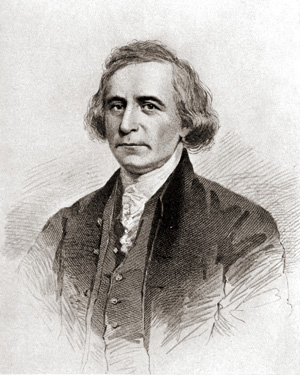Congress Hall, N.Y.
Philip Freneau
With eager step and wrinkled brow,
The busy sons of care
(Disgusted with less splendid scenes)
To Congress Hall repair.
In order placed, they patient wait
To seize each word that flies,
From what they hear, they sigh or smile,
Look cheerful, grave, or wise.
Within these walls the doctrines taught
Are of such vast concern,
That all the world, with one consent,
Here strives to live—and learn.
The timorous heart, that cautious shuns
All churches, but its own,
No more observes its wonted rules;
But ventures here, alone.
Four hours a day each rank alike,
(They that can walk or crawl)
Leave children, business, shop, and wife,
And steer for Congress Hall.
From morning tasks of mending soals
The cobbler hastes away;
At three returns, and tells to Kate
The business of the day.
The debtor, vext with early duns,
Avoids his hated home;
And here and there dejected roves
'Till hours of Congress come.
The barber, at the well-known time,
Forsakes his bearded man,
And leaves him with his lathered jaws,
To trim them as he can.
The tailor, plagued with suits on suits,
Neglects Sir Fopling's call,
Throws by his goose—slips from his board,
And trots to Congress Hall.
The US Custom House, built in 1842, now stands on this site. Previously this was the location of Congress Hall, or Federal Hall. Built in 1700 as New York's City Hall, it was briefly taken over as the first Capitol building of the United States in 1789 until the government moved to Philadelphia in 1790. It was in Federal Hall that the 1st US Congress met in 1789, and the 1st US President, George Washington, was inaugurated.
In 1790 the building reverted to its role as New York City Hall until 1812 when the original structure was demolished.
